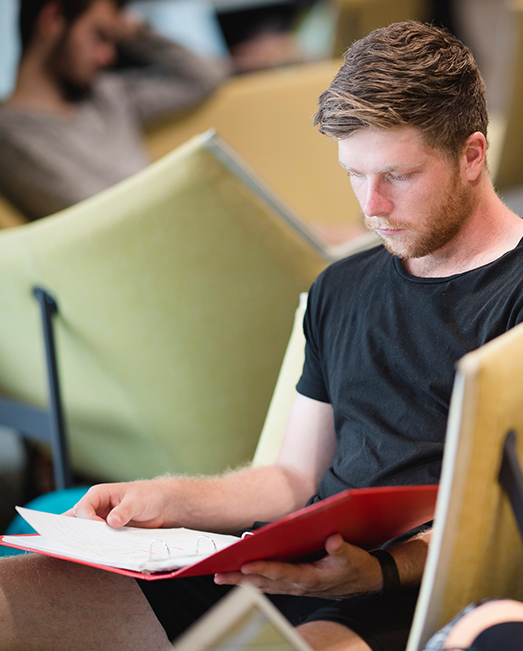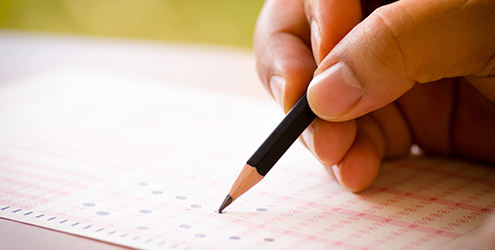Study
Copyright@ Australian Catholic University 1998-2026 | ABN 15 050 192 660 CRICOS registered provider: 00004G | PRV12008
Copyright@ Australian Catholic University 1998-2026 | ABN 15 050 192 660 CRICOS registered provider: 00004G | PRV12008

If exams make you nervous, you’re not alone. We’ve never met a student who doesn’t get at least a tiny bit tense before a major exam. But whether you’ve been studying for months or you feel like a cram session is on the cards, there are some simple steps you can take to improve your performance in an exam.
Staying up till 4am to cram the night before your exam usually does more harm than good (trust us, there are studies). While a refresh of your notes can be beneficial, attempting to learn new concepts and information at the eleventh hour typically gets poor results. There is more value in going to bed at a reasonable time and getting a decent night’s sleep. After all, it’s much harder to perform well in an exam if you can barely stay awake throughout it.
While you might be tempted to use sugary snacks and drinks to help you power through your study sessions, fast burning junk food leads to an inevitable sugar crash. And while there is nothing wrong with a little caffeine boost, coffee and energy drinks will only get you so far. Instead choose to eat healthy whole foods which will give you slow release energy and maximise your concentration through your exam – foods like nuts, eggs, wholegrain breads, fish, and fresh fruits and vegetables are perfect.
Check the list of items you’ll need for your exam and pack your bag ahead of time – for example pencils, pens, calculator and your identification. Some exams require quite specific equipment (like a 2B pencil) while others allow you to bring in notes. Make sure you’ve got everything you need and are entitled to bring to the exam.
Double check the time and location of the exam the night before, and allow plenty of time to travel there. If you’re using public transport, catch the earlier train/bus – you don’t want to be late because there was an unscheduled delay. If you’re driving, allow extra time in case of bad traffic and to find a parking spot.
It’s worth aiming to arrive at least an hour before the exam. You can always flip through your notes while you’re waiting.
There’s nothing worse than sitting in an exam and being distractedly uncomfortable. Make sure you wear comfortable clothes, bring a jacket, and take a bottle of water in case you get thirsty or need to soothe a cough.
It’s normal to get nervous before an exam, but psyching yourself out with negative thoughts isn’t going to help. Instead, remind yourself of successes you’ve had in the past. Picture yourself in the exam feeling confident. Take a few deep, calming breaths. And remember, at the end of the day it’s just an exam, your life doesn’t depend on it. So just get in there and try your best.
Strategy is crucial. Read through the entire paper and work out which questions you’re going to answer and in what order. Allocate rough timeframes for each section to make sure you will get through the whole paper.
Read through the paper and answer the questions you know first. This lets you get a few marks under your belt and boosts your confidence.
If you can’t remember what year Napoleon was born, or have no idea what the value of x is, just move on. When you get stuck, go to the next question and come back to it later if you have time. You don’t want to get caught up trying to answer something you don’t know only to miss out on answering a question you’re certain of.

There is always something you can do to improve your paper. Double check your answers. Make sure you have filled out the whole exam paper. And if you’ve left anything blank, take a guess. You won’t lose marks for answering something incorrectly, but you might scrape some extra marks for partial answers (every half mark counts).
You made it! No matter how you think you performed in the exam, do something nice for yourself. Catch up with friends, watch your favourite show or go shopping. Exams are hard work, you’ve earned a reward.
It’s always worth reflecting on your exam so you can do even better next time. Make a note of anything which you think was beneficial, and learn from where you could improve. But whether you think you nailed it or you’re convinced you’ve failed – it’s done now. Dwelling on your exam and agonising over every little ‘what if’ won’t help anyone, so don’t get too caught up in looking back.
The most crucial thing to remember is exams are important, but they aren’t the end of the world. If you ever feel like the pressure of exams is getting to much, talk to friends, family, teachers or school counsellors. You can also contact Lifeline for free, anonymous support.
Dreaming of life after exams? Find out more about studying at ACU.
Copyright@ Australian Catholic University 1998-2026 | ABN 15 050 192 660 CRICOS registered provider: 00004G | PRV12008